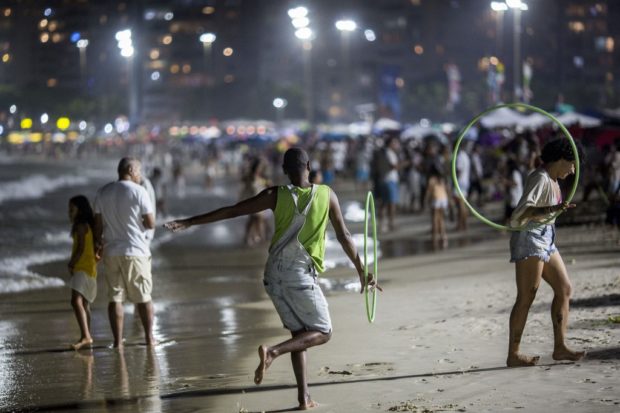Rio’s beach party generates 50% less trash

A man dances near the water on New Year’s Eve at Copacabana beach in Rio de Janeiro, Brazil on December 31, 2021. (Photo by DANIEL RAMALHO / AFP)
RIO DE JANEIRO — Between the pandemic and the rainy weather, it was a muted New Year’s celebration on Rio de Janeiro’s famed Copacabana beach, but there was a silver lining on Saturday: 50 percent less garbage to collect.
The iconic Brazilian beach city’s sanitation service, Comlurb, said it had picked up 320 tons of trash from New Year’s Eve celebrations, less than half the annual average of 724.2 tons from 2018 to 2020.
That included 167 tons in Copacabana following a 16-minute fireworks display over the beach, down from a prepandemic average of 340.6 tons, it said.
“We’re going to have the beaches and seaside clean much earlier than usual,” said Comlurb head Flavio Lopes, as nearly 5,000 trash collectors finished the cleanup job by 9 a.m.
After canceling its world-famous New Year’s Eve festivities last year because of COVID-19, Rio resumed a low-key version this year, encouraging revelers to stay close to home and scrapping concerts and public transportation.
Article continues after this advertisementThe festivities in Copacabana drew just a fraction of the record 3 million people from two years ago, as rainy weather added to the dampened atmosphere created by the Omicron variant.
Article continues after this advertisementBrazil has registered nearly 620,000 deaths in the pandemic, second only to the United States.
The Omicron coronavirus variant dampened New Year festivities around much of the world, with Paris canceling its fireworks show, London relegating it to television, and New York City scaling down its famous ball drop celebration in Times Square.
The illuminated ball made of Waterford crystal panels slid down its pole at the midnight hour in Times Square, but only 15,000 spectators were allowed into the official viewing area instead of the usual 58,000.
Elsewhere around the globe, events were scaled back or canceled outright, such as the traditional fireworks over the Petronas Towers in Kuala Lumpur.
Midnight passed in Paris without a planned fireworks display or DJ sets, as city officials canceled events planned on the Champs-Élysées following the advice of a scientific panel that declared mass gatherings would be too risky.
In the Netherlands, where outside groupings of more than four people are banned, police dispersed several thousand people who had defiantly gathered at Amsterdam’s central Dam Square, ANP news agency reported.
But in London, where a fireworks display and light show had been canceled in October, officials announced on Friday the spectacle would come to life on the television screen, as Big Ben rang in the New Year for the first time since 2017 following a restoration.
BBC images of the fireworks showed very light vehicle traffic and virtually no in-person spectators.